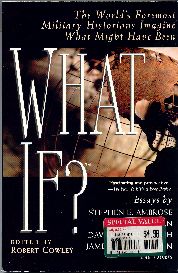
What If: The World's Foremost Military Historians Imagine What Might Have Been
Robert Cowley, ed.
Berkley Books, 2000, 395 pages

|
 hat-ifs" are exercises in predicting
what would have happened if some single historical event had happened
differently. Most of the articles in his book do not consider
goofy, far-fetched what-ifs such as "What if Hannibal had the H-Bomb"
or "What if the Germans had attacked Paris with Stuka dive bombers during
the French Revolution", but are instead thoughtful essays describing crucial
focal points in history, when everything could have gone wrong, and often did.
Of course, if things never went wrong, there would be no history.
hat-ifs" are exercises in predicting
what would have happened if some single historical event had happened
differently. Most of the articles in his book do not consider
goofy, far-fetched what-ifs such as "What if Hannibal had the H-Bomb"
or "What if the Germans had attacked Paris with Stuka dive bombers during
the French Revolution", but are instead thoughtful essays describing crucial
focal points in history, when everything could have gone wrong, and often did.
Of course, if things never went wrong, there would be no history.
Some of the essays, however, do come close to the former category; for example, one article supposes that if Alexander the Great had been killed in Anatolia before achieving the honorific "great" (presumably while he was just "pretty good"), Greek civilization, subsequently carried forward by Athens instead of Macedonia, would have eventually fought the Carthaginians, while the Romans, after massacring the inhabitants of Athens, would have adopted the Persian dualistic religions of Ahuru-Mazda: no Christianity, no Islam, and no Renaissance. This scenario is more than a little speculative. Or "what if" Napoleon had selected General Bernadotte instead of Davout to attack Vienna and consequently lost at Austerlitz; would the German reunification and the subsequent World Wars still have occurred? One might as well ask, what if Napoleon had had cruise missiles and nuclear submarines, and attacked South America instead of Russia? This author then goes on to say Napoleon never should have attacked Russia and should have stayed out of Spain. Well duh.
Other essays use "what if" more conservatively as a device to focus on the importance of a single event that could have happened differently, such as the unexpected and fortuitous death of Ogadai Khan, which saved Western Europe from Mongol invasion in the 13th century. These essayists restrain their wild speculation about improbable occurrences and use the 'what-if' as a didactic tool to show that the presence or absence of a single individual can have enormous consequences. In the unending train wreck of history, even a minor change can alter how the cars pile up.
Several of the articles discuss how easily American history could have gone terribly wrong, from the incredible strokes of luck that prevented defeat in the Revolutionary War, such as the British soldier who unwittingly saved democracy by refusing to shoot George Washington in the back, and of course the Battle of Midway, where a delay of five minutes by either party could have resulted in a catastrophic American defeat and a Japanese invasion of Hawaii. The defeat of Chiang Kai-Shek, and the subsequent decades of poverty, instability and death in Asia after Chiang was restrained by U.S. General George C. Marshall, who insisted on "dialogue" with the Communists rather than allowing a partition of China and Manchuria, has dire lessons for Ariel Sharon in the Middle East today.
The succeeding book, What If 2, is far less interesting, coming to profound conclusions like "If Socrates had died, there would be no Socrates." and exploring wild improbabilities like Napoleon invading America and the Pope somehow stopping the Nazi Holocaust.
